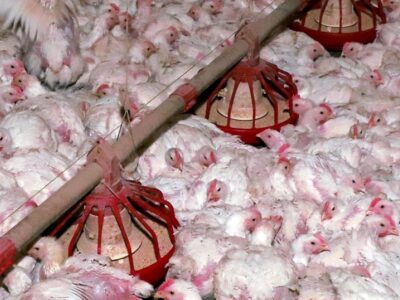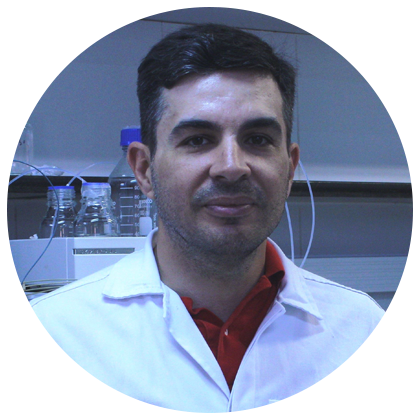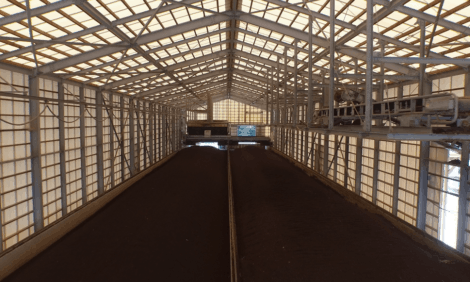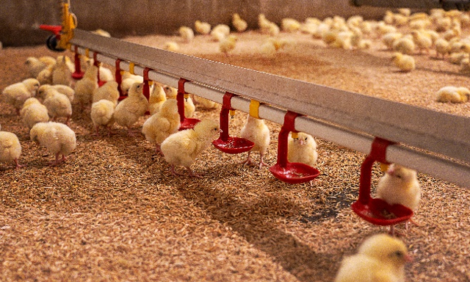



Hops have potential to reduce antibiotic use in poultry farming
Hop extracts do not compromise the flavor and smell of the meat; chickens supplemented with the plant had higher amounts of antioxidantsA study carried out by researchers from the São Carlos Chemistry Institute (IQSC) at University of São Paulo (USP) showed that it may be feasible to reduce the use of antibiotics in the diet of broiler chickens by using hop extracts, a climbing plant from the cannabinaceae family used in the composition of beer. The extracts were able to perform the same function as drugs, without compromising the flavor and smell of the meat. Chickens supplemented with the plant also had a higher amount of antioxidants. An article describing the work was published in the scientific journal International Processes.

A common procedure carried out by chicken farmers is the incorporation of growth-promoting antibiotics into the birds' diet so that they develop faster and have a lower risk of becoming ill, no longer compromising the quality of the meat or reducing the number of animals suitable for cutting. However, traces of antibiotics can remain in the birds' organs after slaughter and be ingested by consumers, contributing to the emergence of resistant bacteria. Furthermore, medication residues can also become a barrier when exporting chickens, which undergo rigorous health analysis in the destination country, evaluating whether the food meets local standards.
The researchers conducted experiments with dozens of broiler chickens that were supplemented with varied diets for 42 days at the Escola Superior de Agricultura Luiz de Queiroz (Esalq) at USP in Piracicaba. After the period, the animals were slaughtered and chicken breast fillets were roasted on a common grill to later be chemically analyzed in the IQSC laboratory. Experts observed that the meat of chickens whose feed was mixed with hop extracts had similar properties to those that received a conventional diet (with antibiotics), presenting the same aroma, consistency and various compounds desired for good quality roast chicken meat, such as aldehydes and pyrazines. Furthermore, the meat of chickens that consumed hops throughout their lives had a greater capacity to resist oxidation (degradation) processes compared to meat from animals that did not receive the plant extracts.
Until then, there were no studies in the scientific literature that assessed whether the application of hop extracts in chicken feed could compromise the chemical composition of the meat.

“Our idea was to investigate whether the use of hops could modify the aroma and flavor of roast chicken meat, and we saw that this did not happen. Furthermore, we observed that the meat of chickens supplemented with plant extracts, especially at a concentration of 30 milligrams per kilogram of feed, had a greater amount of antioxidants compared to the control group (without hops in the diet). Finally, we also identified in the meat of chickens that received hops a large number of compounds important for their flavor,” explains Stanislau Bogusz Junior, professor at IQSC and supervisor of the work, which is the result of Larissa Chirino's master's research.
Sustainability
The increased interest in more ecological sources of antioxidants is what has stimulated research into natural alternatives to increase poultry production and make the process more sustainable, with hops being one of the sources of ingredients that stands out for its antioxidant activity. Chemically composed of phenolics, essential oils and some acids, the plant is used in breweries to control oxidative processes and microbial contamination, in addition to being responsible for imparting bitterness to the drink and increasing its durability.

“In poultry farming, the growth promoters typically used are antibiotics, such as flavomycin, bacitracin and avilamycin. However, the widespread use of these medicines in poultry production is of extreme concern as it leads to contamination of the environment and food and the development of bacterial resistance, posing a risk to animal and human health. We investigate the use of natural products as alternatives for microbial control. Looking from a cost:benefit point of view, hops are an attractive alternative for the production of healthier, environmentally friendly and, in a certain way, organic chicken meat. Lupulones (extract used in the work) are generally a by-product of the brewing industry and, therefore, could be used at a relatively low cost,” says Daniel Cardoso, professor at IQSC and also author of the work.
“With this work, we demonstrate the possibility of using a natural extract to replace growth promoters and reducing export barriers and antibiotic residues in meat. Nowadays I work with food legislation and regulation, and I see how rigorous this issue is outside the country,” says Larissa Chirino.
It highlights the practical nature of the research, bringing an application that is of interest to different audiences.
“For hop producers, it also becomes a new commercial possibility, as they could give the plant another purpose and open a new market,” she says.

The study, which was supported by the São Paulo State Research Support Foundation (FAPESP), through the Innovation Fund Denmark partnership and the thematic project Bread and meat for the future, the latter coordinated by professor Daniel Cardoso, also had contribution from the National Council for Scientific and Technological Development (CNPq), the Coordination for the Improvement of Higher Education Personnel (CAPES) and participation by IQSC doctoral student Mirella Romanelli.
(With information from Henrique Fontes, from the IQSC Communications Office)
Headline image courtesy of Ari Dias/AEN-PR








